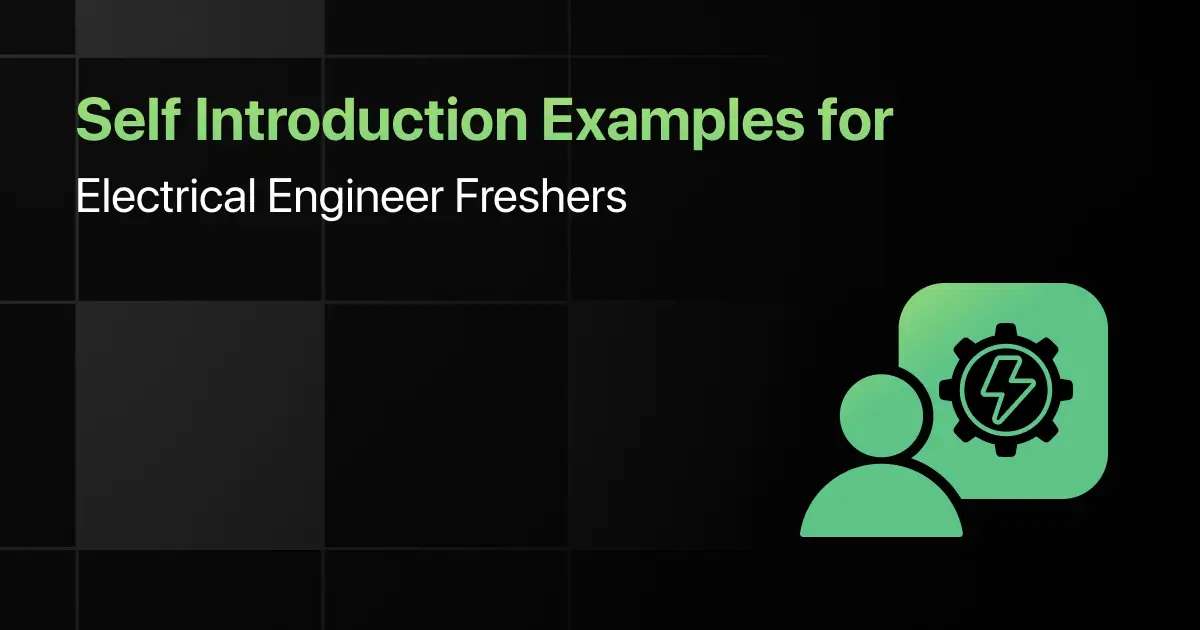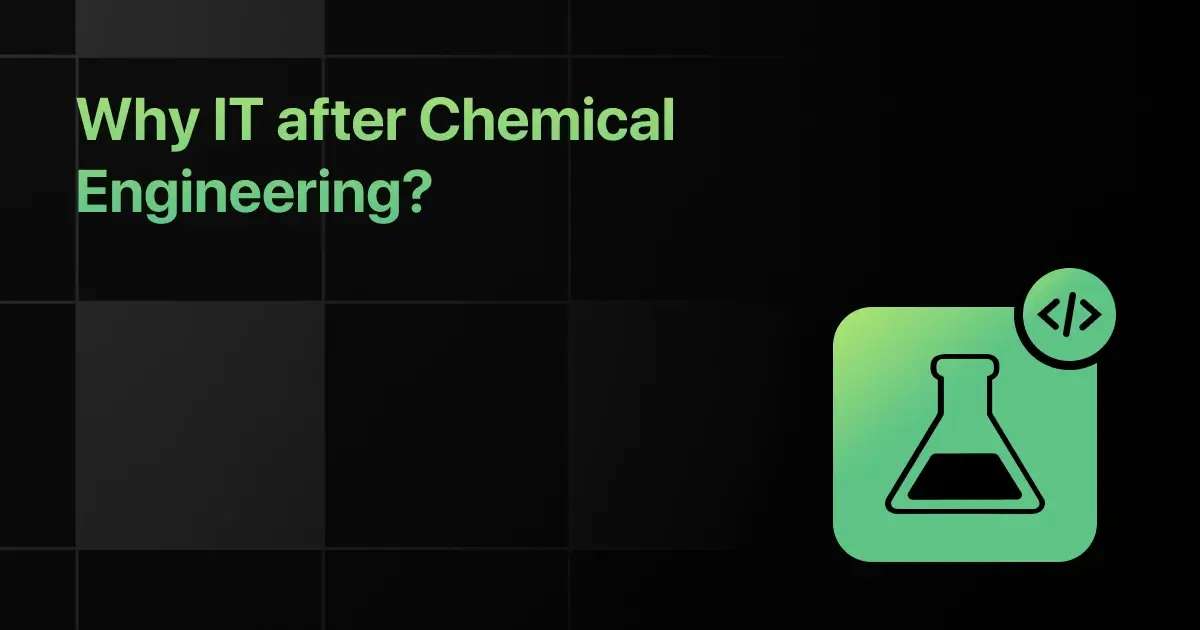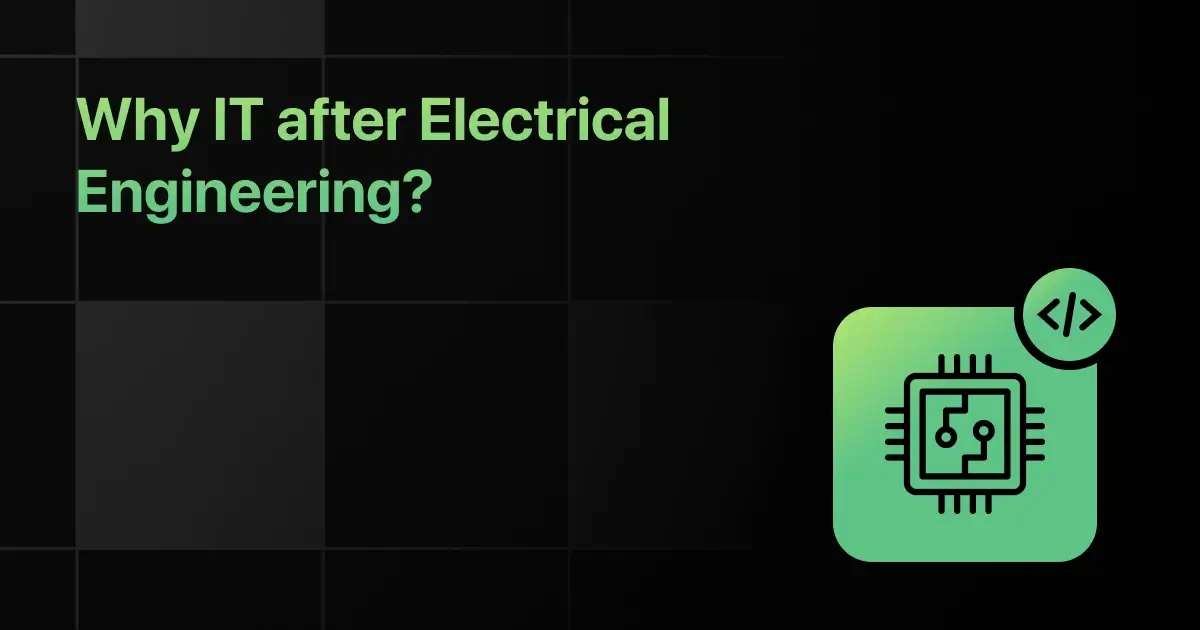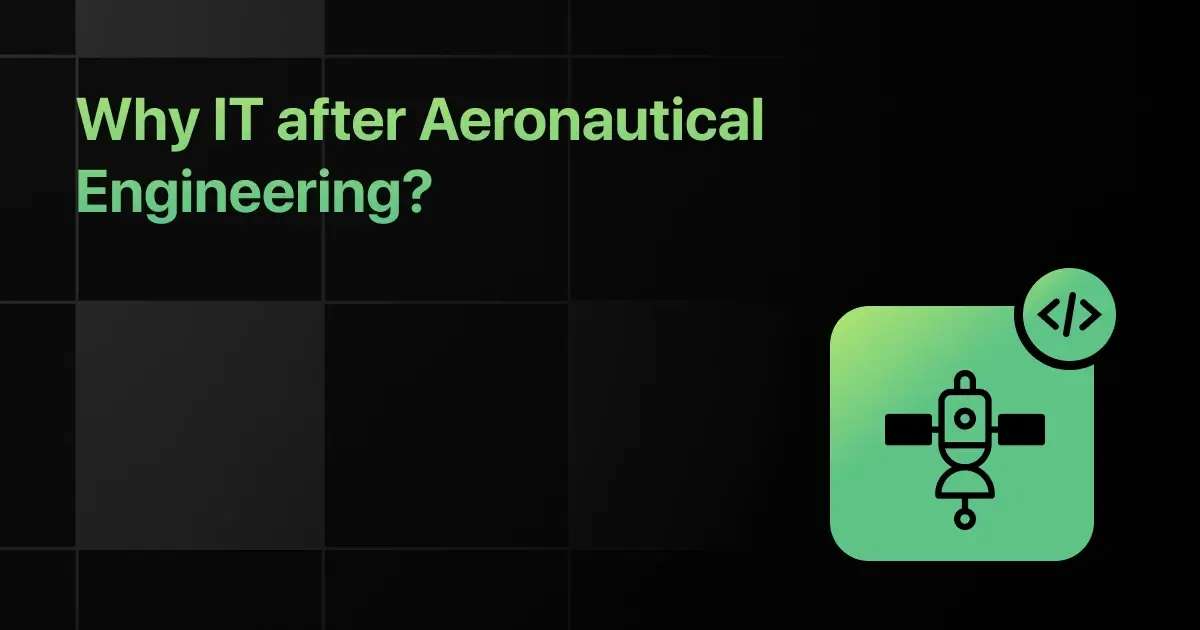Self Introduction Examples for Electrical Engineer Freshers

Are you excited to power up your career in electrical engineering?
Giving a good self-introduction for an Electrical Engineer fresher can be a great way to make a strong first impression.
Self Introduction Examples for Electrical Engineers
Below are the 5 self-introduction examples for electrical engineers:
1. Job Application Introduction
I’m Rohan, a recent Electrical Engineering graduate from Metro University with a focus on power systems and renewable energy.
My capstone project was designing a solar power system for remote areas, which aimed to improve energy access.
I’m excited to bring my skills in MATLAB, AutoCAD, and circuit design to your team and help contribute to innovative energy solutions.
Template Version
I’m [Your Name], a recent [Your Degree] graduate from [Your University] with a focus on [Your Specialization].
For my final project, I worked on [briefly describe your project], which helped achieve [mention any significant outcome or goal].
I’m eager to use my skills in [mention specific tools, techniques, or areas you specialize in] to contribute to [mention what you hope to achieve with the team].
Logic Behind This
This introduction is designed to quickly share your background, a project that shows your abilities, and how you can add value to the team.
It’s straightforward and highlights the skills and experience that align with the job.
Mistakes to Avoid
- Leaving out specific skills or tools: Mention your key skills to show what you bring to the role.
- Using complex language: Keep it simple so it’s easy for the hiring manager to understand.
- Not tailoring to the job or company: Connect your skills and goals with what the company is looking for.
2. Networking Introduction
Hi, I’m Rohan! I recently graduated in Electrical Engineering from Metro University, where I focused on renewable energy and power systems.
I worked on a solar power project to improve energy access in remote areas, and I’m interested in sustainable energy solutions.
I’d love to connect with others in the field and learn more about the latest trends and projects in renewable energy!
Template Version
Hi, I’m [Your Name]! I recently graduated in [Your Degree] from [Your University], specializing in [Your Specialization].
I worked on [describe your project briefly], which focused on [mention the purpose or goal].
I’m excited to connect with others who are passionate about [mention your area of interest] and learn more about new projects and ideas in the field.
Logic Behind This
This introduction shares your background, interests, and project experience, inviting others to engage with you on similar topics.
It’s designed to make it easy for people with similar interests to connect with you.
Mistakes to Avoid
- Being too formal: Keep it casual and approachable; you’re here to make connections, not a job application.
- Not mentioning your interests: Include your interests to help others find common ground with you.
- Skipping an invitation to connect: Encourage others to reach out by showing interest in their projects as well.
- Using technical jargon: Keep the language simple so everyone can follow along, even those from different backgrounds.
3. Postgraduate University Application Introduction
Hello, I’m Rohan, a recent Electrical Engineering graduate from Metro University. I focused on renewable energy and power systems and developed a solar power system for remote areas as my final project.
I’m applying to your Master’s program to deepen my skills in sustainable energy and advanced power systems.
I’m excited to work with faculty and students who are passionate about creating innovative energy solutions.
Template Version
Hello, I’m [Your Name], a recent [Your Degree] graduate from [Your University] with a focus on [Your Specialization].
My final project involved [describe your project briefly], which aimed to [mention the project goal or outcome].
I am applying to your Master’s program to expand my knowledge in [mention specific area of interest] and to gain advanced skills in [mention another related area].
I’m excited about the opportunity to work with others who share my passion for [mention your long-term goals or interests].
Logic Behind This
This introduction is structured to demonstrate your background and interest in advanced studies.
It connects your past work with your future goals, helping the admissions team understand how their program aligns with your career plans.
Mistakes to Avoid
- Being too vague about your goals: Clearly explain why you want to join this program and how it will benefit your career.
- Not mentioning project outcomes: Share the purpose of your project to highlight your experience.
- Sounding too general: Tailor your introduction to show you’re familiar with the program and eager to learn more in your area of interest.
4. Professional Conference Introduction
Hi, I’m Rohan, an Electrical Engineering graduate from Metro University with a focus on renewable energy.
For my final project, I designed a solar power system to improve energy access in remote areas, and it cut power costs by 20%.
I’m here to learn more about the latest trends in renewable energy and connect with professionals in the field.
Template Version
Hi, I’m [Your Name], a [Your Degree] graduate from [Your University], specializing in [Your Specialization].
I recently worked on [describe your project briefly], which aimed to [mention the project goal or outcome].
I’m here to connect with others in [mention your field of interest] and learn more about current trends and ideas.
Logic Behind This
This introduction helps you quickly share your background and interests at a professional conference.
It’s friendly, making it easy for others to understand your work and engage in a conversation about similar topics.
Mistakes to Avoid
- Providing too many details: Keep it brief to avoid overwhelming people with information.
- Sounding too formal: Use a conversational tone to make connections easier.
- Not showing interest in others: Make sure to show that you’re open to learning from others, not just sharing about yourself.
- Skipping an invitation to chat: End with an invitation to discuss their projects or work to keep the conversation going.
5. Online Profile Introduction
Hi! I’m Rohan, a recent Electrical Engineering graduate focused on renewable energy and power systems.
I designed a solar power system as my final project, which reduced energy costs by 20% for remote areas.
I’m excited to connect with other professionals in sustainable energy and electrical engineering to exchange ideas or just want to chat about the latest in energy solutions!
Template Version
Hello! I’m [Your Name], a recent [Your Degree] graduate with a focus on [Your Specialization].
I recently worked on [briefly describe your project], which helped achieve [mention any significant outcome].
I’m here to connect with others in [mention your field or area of interest] and explore new ideas in [mention your field or topic]!
Logic Behind This
This introduction is perfect for professional networking sites like LinkedIn. It’s concise, shares your main achievements and interests, and invites others to connect with you over shared interests in the field.
Mistakes to Avoid
- Sounding overly formal or stiff: Keep it approachable and engaging to attract meaningful connections.
- Not including an invitation to connect: Encourage others to reach out if they have similar interests or would like to chat.
- Making it too long: Keep it brief and focused so your main points are easy to read quickly.
Final Words
A well-prepared self-introduction is your first step towards a successful career in electrical engineering.
It highlights your enthusiasm and sets you up for future opportunities to grow and learn.
Frequently Asked Questions
1. How should an electrical engineer fresher introduce themselves in an interview?
An electrical engineer fresher should start with their name, educational background, and a brief mention of any relevant coursework or training.
2. What key elements to include in a fresher’s self-introduction for electrical engineering roles?
Key elements include educational qualifications, specific technical skills like circuit design, software tools they are proficient in (e.g., MATLAB, AutoCAD), and internships.
3. What common mistakes should electrical engineer freshers avoid in their self-introduction?
Common mistakes include being too vague, listing unrelated achievements, and not emphasizing practical skills or relevant experience.
4. Should freshers highlight academic projects during self-introductions?
Yes, freshers should highlight academic projects that demonstrate technical skills and practical application, especially those involving circuit design, power systems, or electronics.
5. How can electrical engineering freshers talk about internships during their introduction?
Freshers should briefly mention where they interned, and their responsibilities like troubleshooting, designing, or testing electrical systems can be relevant.
6. What is an effective way for freshers to wrap up their self-introduction?
An effective way for freshers to wrap up their self-introduction is by reiterating their enthusiasm for the role and the company.
7. What is the ideal length for a self-introduction for freshers in electrical engineering?
The ideal length for a self-introduction for freshers in electrical engineering is about 60 to 90 seconds.
Explore More Self Introductions
Related Posts

How to Answer: Why IT After Chemical Engineering?
Switching from chemical engineering to IT might feel like a big change—after years of working with reactions, processes, and materials, …






